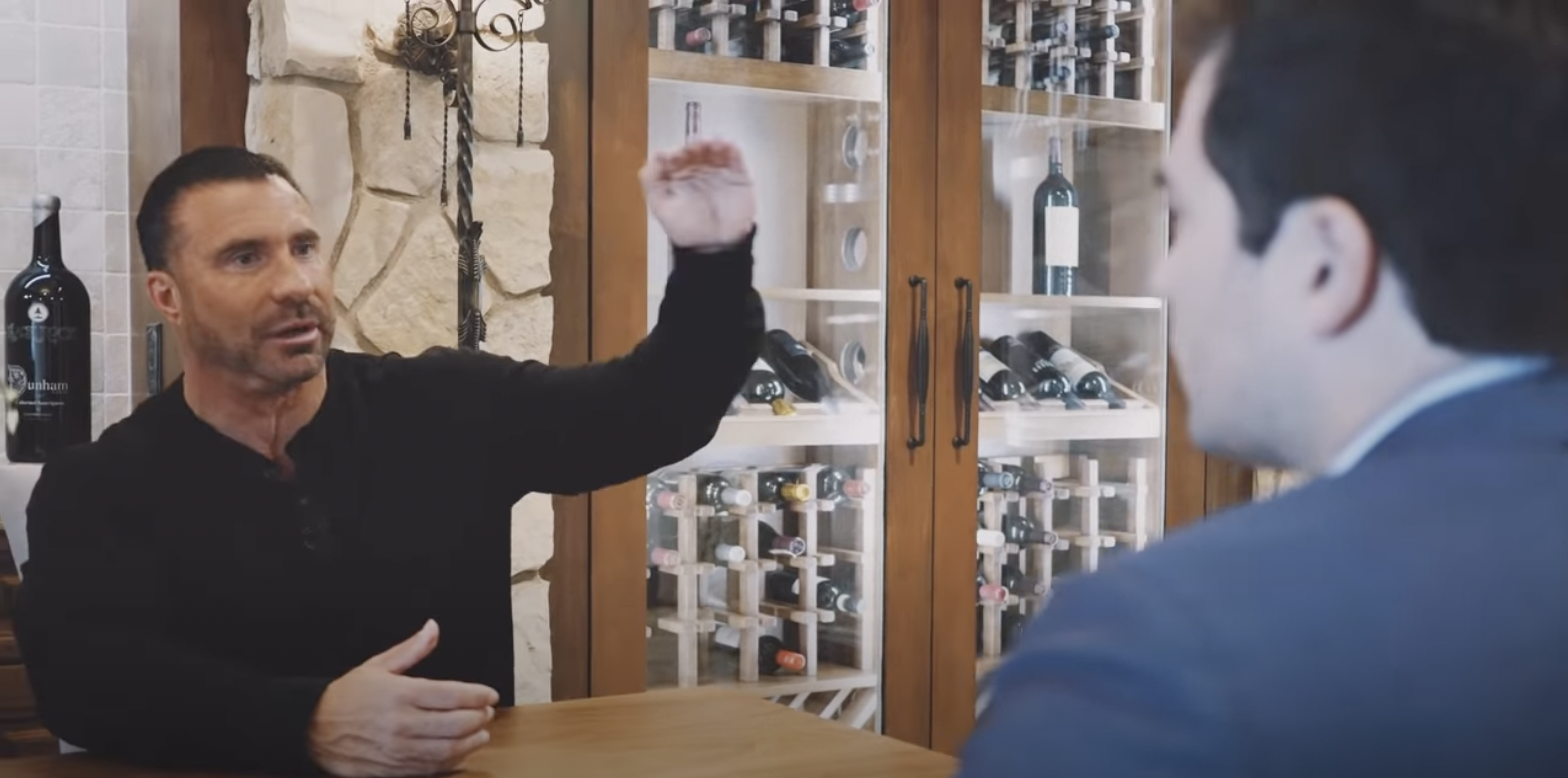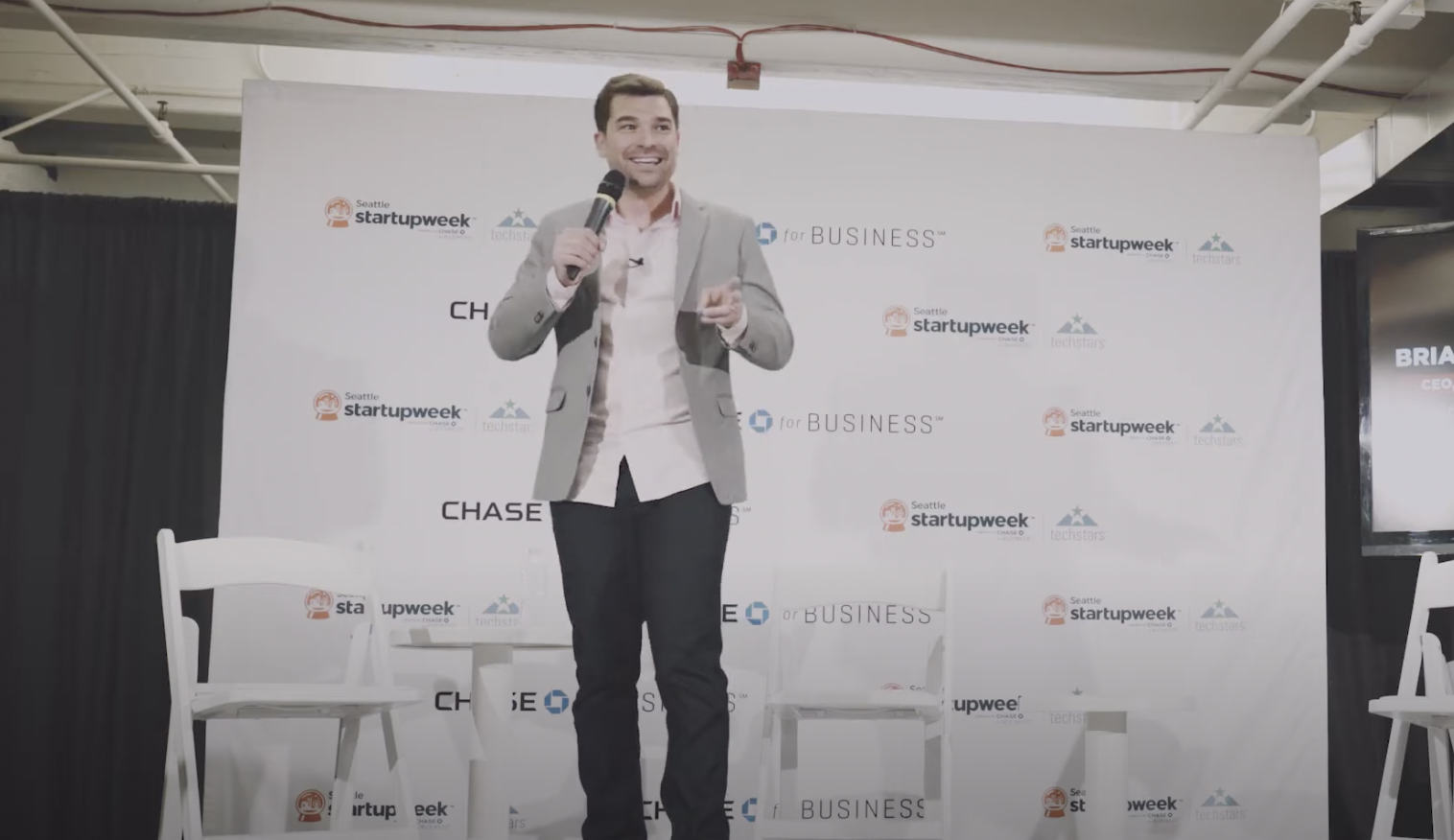Here's Why Top B2B Sales Leaders NEVER Get Prospect Ghosted
There's no feeling like the one you get when an ideal B2B sales lead falls off the face of the earth with no explanation why. Especially when you thought they were in the palm of your hand!
The consequences of prospect ghosting go way beyond bad feelings, though. Unless you fix your ghosting problem, you'll end up with a cascade of other issues, including:
- Feeling completely out of control
- A messy sales pipeline
- Overall poor business growth
However, would you believe me if I said that top B2B sales leaders almost never get ghosted by qualified leads...?
Believe it or not, but leading sales reps use a set of sales techniques that make them ghost-resistant. And, there is a single, simple factor that explains why each technique works.
That being said, we're sharing exactly what top sales leaders do to make themselves ghost-resistant and why their techniques are so effective!
Being ghosted by a B2B lead is not only painful, but totally preventable. Joining the leagues of top sales leaders who never get ghosted is a simple matter of applying these principles.

Prospect Ghosting Comes Down to This One Factor…
So, what's the secret…? Why do top sales representatives never get ghosted?
Straight-up: Top B2B sales leaders never get ghosted because they know how to stay in power throughout the B2B sales cycle. By staying in power, they come across as an expert at what they do, and experts are irreplaceable in the eyes of prospects!
At the end of the day, the techniques that sales leaders use are all intended to enhance their power. From lead generation to the closing sales pitch, the techniques keep them in control.
Think of it like this... Having power over the sale means that you come across as an irreplaceable expert at what you do, like a top-tier surgeon whose insights aren’t questioned.
So, if you're used to being ghosted, then it's probably because you're not in power over the process. Even worse, you're giving power up to the prospect!
Now, you might be thinking to yourself... 'But I don't want to be a power-freak' or 'Having too much power will turn the prospect off'.
The hard truth is that if you're not used to the concept of power, it might naturally freak you out at first. But at the end of the day, unless you have power, not only will you not close the deals you want, but your prospects won't get their pain points solved.
Having and exercising power is not bad. Rather, it's the only way to make sales happen, and therefore make a business exist!
Bottom line: Prospects ghost you when you have no power over the sale. When you have no power, you come across as completely replaceable. When you’re replaceable, it’s easy for a prospect to ghost you!
Therefore, you need to use sales techniques that enhance your power. The moment you empower yourself is the moment you become an irreplaceable expert. And, once that happens, you will never get ghosted by a qualified lead again!

Here’s How You Can Empower Yourself to Never Get Ghosted Again!
All you need to do to never get ghosted again is increase your power over the sales process. By empowering yourself, you become an irreplaceable expert who prospects wouldn't even dare to ghost!
Each of these 5 sales techniques all enhance your power. Unless you apply them, you won't close deals and your prospects won't get their problem solved. Moreover, everyone will lose!
Here's exactly how to empower yourself to become a ghost-resistant B2B sales leader!
1. Be Confident In the Value You Bring to the Table
The first step to empowering yourself is to be confident in your own value and the value of your deliverable. When you’re confident in what you bring to the table, others are confident in you, too.
Yet, while every sales rep knows that having confidence is so important to not just prevent ghosting but to overall sales success, few B2B salespeople have it.
What's the problem here? If confidence is so obviously important, why do so few people have it?
Many salespeople lack confidence because they lack enthusiasm for themselves and what they do.
The more enthusiastic you are about what you bring to the table, the more confident you are in it. The more confident you are, the more positive energy you radiate. The more positive energy you radiate, the more confident prospects become in you!
Think of it like this... When you're enthusiastic about something, you are confident and naturally radiate good vibes. That positive energy is palpable, and your ideal B2B company customers will sense it the moment they connect with you. The more positive energy they feel, the more confident they resultantly have in you.
It's simple: Unless you're enthusiastic about what you're doing, you'll likely have low confidence. Low confidence = negative energy that makes B2B customers want to ghost you.

Don’t Reduce Yourself to a Washed Up Used Car Salesperson
You know the old stereotype of the used car salesperson who absolutely blows the selling process and makes customers feel completely unconfident in what they're being sold?
Yeah... It's because the used car salesperson knows that they wouldn't buy the car themself!
They have no enthusiasm in themself or the car, and that low enthusiasm comes across as obvious low confidence to their potential buyers.
In the end, if that used car salesperson does make the sale, it's because they made the customer feel bad or guilty during their buying process, and not because they made them feel good.
In short: Don't reduce yourself to a used car salesperson! Instead, get pumped up about what you have to bring to the table. Enthusiasm will make you feel confident in yourself and your deliverable, so the customer will be confident in their buying decision.
If you wouldn't buy what you're selling or buy from yourself, then you've reduced yourself to a stereotypical used car salesperson who nobody likes!
Confidence and Fear Cannot Coexist
Having enthusiasm helps you build confidence. On the other hand, having fear crushes confidence.
Moreover, confidence and fear can't coexist! More specifically, the fear of failure and confidence cannot coexist.
The moment you start to feel the fear of failure is the moment you lose confidence in yourself and your deliverable. The moment you lose confidence is the moment your sales team starts to feel fear and lose confidence.
Ultimately when you and your entire team feel fearful and unconfident, you create the perfect environment for customers to drop off the face of the earth with no explanation why.
You might be totally enthusiastic about what you do, but fear will put a cover on that internal flame. Therefore, fear is the ultimate confidence buster.

2. Prepare Yourself Inside and Out
Now, this is a simple one… By walking into a sales meeting fully prepared for any potential curve ball that could be thrown at you, it's easy to keep a hold on power.
But, again, just like how almost every B2B salesperson knows that you must be confident to stay in power yet they never amp up their confidence, almost everyone knows the importance of preparation yet they don't prepare properly! Or, even worse, they don't prepare at all.
Here's the thing: Preparation is more than just memorizing a sales pitch or knowing your B2B marketing plan inside and out. Rather, it's mainly about:
- Studying the mindset of customers
- Arming yourself with optics to overcome objections
Unless you prepare in these two specific ways, you can basically hand over all of your power to the customer and give up!
Think of it like this... Wouldn’t an expert surgeon who's about to go into an appointment with a new patient study the patient before meeting them? On top of that, wouldn’t they also be ready to answer any objections that might throw the appointment off track?
Of course they would!
Therefore, in order to keep a hold on power, be sure to prepare yourself beyond just memorizing pitches...

Understand How Your Potential Customers Function Psychologically
At the end of the day, B2B selling is about showing potential B2B buyers that you're the one with the solution for them.
That being said, how can you expect to show prospects what they need if you don't understand their mindset?
Think of it like this: If you're babysitting a small child who needs to wash their hands before eating so you try to explain the concept of germs, the child is unlikely to do what you say because the concept of germs doesn’t make sense to them yet. On the other hand, if you get down on their level to understand their mindset and what does pull at their emotions, you can frame hand-washing in a way that they'll understand and be motivated to do.
Similarly, you need to step into your prospect's shoes to understand their perspective and mindset. When you understand their perspective, you know how to frame the sale in a way that'll motivate them to buy AND see you as an expert who they need.
You can't go through life thinking that everyone's mind is the same as yours. Otherwise, you'll never have any power over anyone.
Prepare Yourself for Possible Objections
In addition to studying your prospect's mindset, you need to do some brainstorming. Specifically, you should brainstorm possible objections that some of your target customers could make, and then come up with optics to overcome them.
For example, having answers to objections like 'Why should we pick you?' or 'What makes this so important' will help you stay in power.
When you walk into a sales scenario ready to face potential objections, you will:
- Feel more confident in yourself
- Reinforce the fact that you are, indeed, an expert who knows what they're doing
Prepare yourself for the most important objections that could be thrown at you, and then practice responding to them with your sales team!

3. Ask More Questions to the Right People
This next sales technique is perhaps the most important one to increase your power and prevent prospects from turning into ghosts.
Not only is it the most important technique, but it's also the most simple.
The technique is asking questions to the decision-makers and then listening attentively.
What makes asking questions so effective?
Asking questions is particularly effective at asserting your power for a few key reasons, including:
- It puts you on offense and the customer on defense
- It gives you an opportunity to gather as much information on the prospect as possible
- You get an opportunity to listen and look like you care deeply about the customer
First off, asking questions puts you on offense, AKA it automatically puts you in a power position. Instead of defending yourself from the customer, you’re running the show.
Second, getting answers to the right questions from your prospects allows you to gather valuable information on them. The more insights you have, the more effectively you can appeal to them.
Lastly, asking questions and then listening attentively comes across as compassion. Prospects will see you as someone who cares about what they have to say, and therefore be less likely to leave you in the dust.
If you ever feel like power is slipping out of your hands, take a deep breath, relax, and then start asking targeted questions.
Listen More Than You Speak
Here's a question for you... How many times have you gotten into a heated debate with someone knowing that you were absolutely right? Not only that, but you knew that the person you were debating knew that they were wrong, yet they kept on going for the sake of arguing.
If you're like most people, then you've certainly been there before.
Now, here's another question: How did you know that the other person knew they were wrong? What signs did they show? Was it how fast they were talking or the defeated look in their eye?
More likely than not, you knew that they knew they were wrong because they just wouldn't stop talking!
The most clear sign that somebody knows they're losing a discussion and they feel powerless is if they talk 99% of the time and only listen for 1%.
That being said, by asking questions and then listening attentively, you create the opposite effect... You make the prospect feel like you have your guard down because you know that you're right! You don't need to ramble forever because you're confident in your own expertise.
Questions are your most powerful sales tool as they put you on offense. Then, listening instead of talking is what solidifies you as an expert who doesn't need to defend their own level of expertise. Rather, your expertise speaks for itself!

4. Keep Your Sales Process as Short & Sweet as Possible
In addition to talking more than listening, having a longer sales cycle is another clue that prospects use to determine that you aren't an expert, and therefore makes it easy for power to slip from your hands.
Think of it like this... When you give it to prospects straight and don't waste their time, then they're going to get the impression that you know exactly what's up!
On the other hand... If you take forever to move through the ins-and-outs of your deliverable and make reaching the purchasing decision phase extremely far out, then you'll give them the impression that you're just talking your tail off because you don't really know what you're doing and can afford to waste time.
Straight-up: Keep the sales funnel as short and sweet as possible so that you can get to decision-making time ASAP!
Consider this... When you go to see a doctor, how much time do they usually spend with you? Five, ten, or maybe fifteen minutes? The fact that they don't waste any time yet tell you exactly what you need to hear is what helps them maintain power.
Unfortunately, many sales pros have been sold the idea that the B2B sales process needs to be long and drawn out to be effective. However, they're wrong, and they should take some tips from the B2C sales world in which the process is exceedingly short!
While you shouldn't necessarily shorten your process up as much as they do in the business-to-consumer sales world, the point is that you should make it as short and sweet as possible.
The longer your process is, the greater the odds that power slips out of your hands.

Give It to Your Customers Straight
Never forget that your prospects don't know what their problems are or how to solve them. If they did, then they wouldn't be in the middle of the sales funnel talking with you!
Therefore, you need to get it straight with prospects that you know exactly what their problem is and how to solve it. Be as straight to the point as possible!
While your diagnosis might sting them a little bit, they will ultimately be thankful that you were so honest and up-front with them. The last thing you should do is beat around the bush.
Don't waste time in the sales process asking prospects what their pain points are, because:
- They don't know what they are
- They don't know how to solve them
- Asking them absolves your power
Be the expert you know you are and tell your prospects what they need to hear. They'll be thankful to have you, and the last thing they'll think about doing is ghosting.
Don't Waste Time Creating Proposals
How often does this happen to you: You make it through the initial sales meeting and then the prospect hits you with an email reading 'Send us your proposal and then we can talk again next week’?
If you're like most sales pros, then this happens to you on the regular. And unfortunately, if you choose to follow through on the prospect's wishes, you set yourself up to become prime ghosting material!
The moment you email the proposal is the moment you reduce yourself being virtually powerless! The hard truth is that:
- You shouldn't have to waste hours developing a proposal
- You don't want to give the impression that you're just a vendor
At the end of the day, vendors have one-size-fits-all proposals, but not you, a powerful expert! Therefore, don't give the impression that you're a powerless vendor by sending proposals.
If a prospect asks you to send them a proposal, hit them with a, 'You want a proposal already? What I should be doing instead is getting to know you more so that I understand exactly how we can get you to a better place! How about we set up another call for tomorrow so you can tell me more about you?'.
There's no point in making the sales process longer than it needs to be by sending out pointless proposals. Not only will it elongate the cycle to reduce your power, but it'll give off the impression that you're a replaceable vendor.

5. No Negotiation EVER In Business-to-Business Sales
If your B2B sales strategy includes room for negotiation, then you're basically taking any power you have and throwing it in the trash.
Once you know what you're worth, you need to stick to it... No negotiating your price tag!
Why?
Because, negotiating cheapens you. When you cheapen yourself, the message that you send to prospects sounds like this: 'I know I said I'm an expert at what I do, but I'm willing to cheapen myself if it makes you happy, even if it means I have to self-sabotage!'.
What kind of an irreplaceable expert sabotages themself like that?
While you might feel like you're being nice by negotiating, what you're really doing is negating all the hard work you put in to make yourself come across as an expert.
The moment you start to negotiate price is the moment you hand your power over to the decision-makers and turn yourself into a disposable vendor!
Would an Expert Surgeon Negotiate Price?
Imagine walking into a doctor's office to meet with the best orthopedic surgeon in your region. The surgeon makes it clear to you that they understand your problem and know exactly how to correct it with surgery. Then, you ask the question, 'How much is this going to cost me?'. The surgeon tells you the price, your eyes pop out of your head, but then they say, ‘I'm willing to give you a discount if it means you'll stay!’.
Now, while you'll probably never end up in that same situation, can you imagine how you would feel if a supposedly-expert surgeon told you that they were willing to negotiate their price with you? Wouldn't it make you call their expertise into question?
Of course it would!
Just like how a surgeon doesn't negotiate their price, neither should you. While you might feel like you're simply being nice, negotiating makes the prospect question your expertise. The moment your expertise is questioned is the moment you lose power.
Replaceable vendors negotiate because they know that there is somebody else out there who can do exactly what they do for less!
But, you're not a vendor... you're an irreplaceable expert! So, just don't negotiate.

Final Thoughts on Why Top B2B Sales Professionals Never Get Ghosted
When it's all said and done, ghosting comes down to power. It comes down to whether or not you use it the right way to leverage yourself up into the position of an irreplaceable expert.
Remember, if you don't take control, power inevitably falls into the hands of your prospects, and nothing good ever comes out of a situation where the prospect has power.
The biggest changes in outcomes are often made by small shifts in your sales approach…
Will you change your approach to grab onto power so that you never get ghosted again? Or, will you let power slip out of your hands so that the prospect doesn't get what they need and you lose out on a major sales deal?
You May Also Like
These Related Articles

Prospect Ghosting You? 5 Tips to Prevent Being Ghosted Again

Prospect Ghosting 101: How To Get Prospects Back After They've Ghosted




